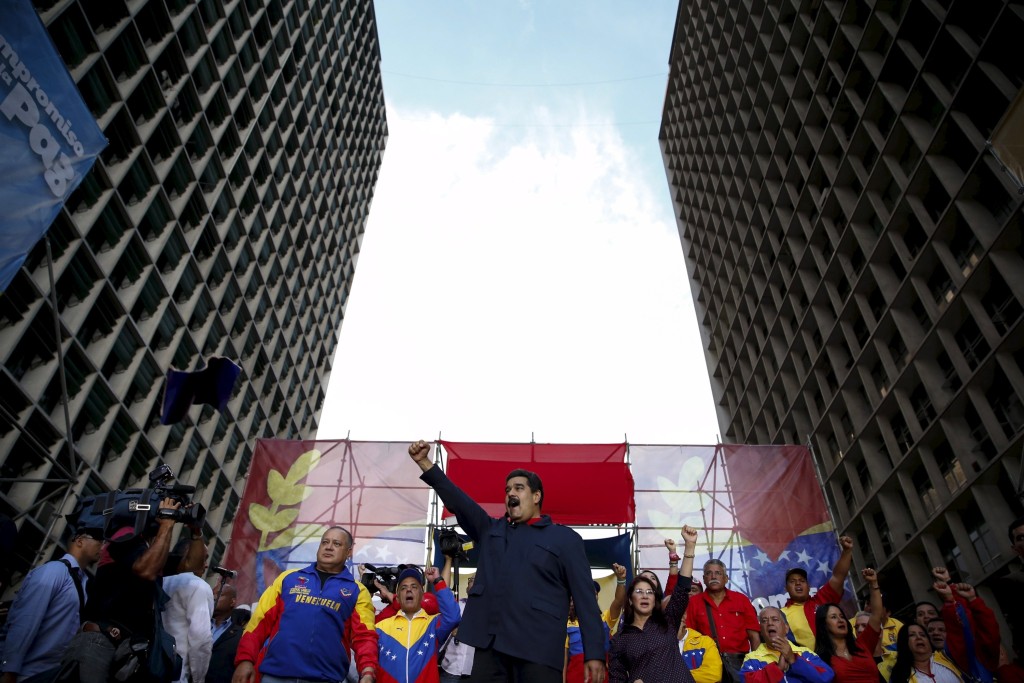Venezuelan president cites ‘emergency’ and ‘coup’ plot as developments pile weight on government with key parliamentary elections on the horizon.

Venezuela’s President Nicolás Maduro addresses a rally outside the National Electoral Council headquarters in Caracas.
CARACAS — Venezuela’s Nicolás Maduro called on his supporters yesterday to prepare an “anti-coup” plan to ensure the ruling Socialist Party (PSUV) wins the crucial upcoming parliamentary elections on December 6, as new developments pile further pressure on the president.
Speaking during a rally with supporters outside the National Electoral Council (CNE) headquarters in Caracas, Maduro warned that Venezuela faced an “emergency” and “counter-revolutionary coup” from the opposition after the vote, who he implied would not respect the results of the upcoming elections. Many analysts have tipped the ruling party to lose the balance of power in the National Assembly in December, but others caution that it’s not the first time the opposition has been tipped to come out on top.
“The Bolivarian Revolution declares an emergency with anti-coup plan to ensure electoral victory on December 6. This revolution will not be betrayed nor given up on. Let them know, the pelucones (“rich people, snobs”),” he said in a speech to hundreds of supporters.
The PSUV leader has escalated his rhetoric in recent days after the prosecutor of jailed hardline opposition leader Leopoldo López grabbed column inches across the world after fleeing to the United States and denouncing the trial as a “farce.”
Franklin Nieves, speaking in interviews published online with Venezuelan website La Patilla and US newspaper The Wall Street Journal, said that the trial of the controversial right-wing former mayor had been based on “false evidence” and at the whim of the government, which pressured the prosecutor to push on with the case.
López, the 44-year-old leader of the Popular Will party, is a divisive figure in Venezuela, where he has been accused of supporting a coup that briefly removed then-president Hugo Chávez from power in 2002 and for calling for the unconstitutional removal of Maduro from office. His trial and imprisonment drew international condemnation, especially in the United States which has cricitized the absence of due process and slammed Venezuela’s judiciary as biased.
Speaking yesterday, Venezuela’s Attorney General Luisa Ortega said that Nieves had been fired for “abandoning his post.” Rubbing salt in the wounds, she added that the prosecutor had “lost his right to a pension, regrettably.”
She said however that Nieves would not face punishment, “unless we find some element that makes us presume some irregularity,” despite his apparent desire to claim asylum for him and his family in Miami, where he has now fled to.
Nieves’ defection has added to the dramatic polarization of the country’s political climate, providing further ammunition for the opposition’s claims of a clampdown by the government on human rights.
Challenges opposition
Seeking to improve his democratic credentials ahead in the face of international criticism, Maduro challenged the main opposition coalition yesterday to sign a document promising to respect the results of December’s elections.
Appearing on national television, Maduro inked an agreement, explaining “it is not a protocol signature, given as part of an election campaign, it is a commitment to respect and ensure respect for the popular will in the parliamentary elections,” using the name of López’s party indirectly.
“Whoever wins, won and whoever loses, lost, by a vote, more or less and ready… we will be the first to say ‘Amen, the people decided,’” he said.
The document has four key points, among which are vows to “act with strict respect for democracy, peace in the country and the Constitution of Venezuela and to abide by the guidelines issued by the CNE as the only legitimate power of the state and legally competent power to referee in the elections as the ultimate expression of popular sovereignty.” Maduro also announced that from Thursday, the document will be taken around to public places so all Venezuelans can “sign for peace.”
Jesús Torrealba, the executive secretary of the opposition Democratic Unity Roundtable (MUD) coalition, dismissed Maduro’s challenge, branding the president a “comedian” and saying the document was not serious.
“What kind of agreement to respect results can be signed by someone who has already said they going to win ‘by any means’?” he declared, calling for more international observers to oversee the vote.
Maduro is already under pressure amid widespread product shortages as oil prices decline and the economy continues to contract. The International Monetary Fund (IMF) has forecast a 10-percent contraction in Gross Domestic Product (GDP) this year and the country already registers one of the highest inflation rates in the world — 159 percent.
The government also railed against ongoing attacks to the country’s electricity grid yesterday, stating that installations had been attacked 18 times in the last month alone. The opposition claims that the government’s “inefficient” management of the industry has caused power outages, though Maduro’s administration argues that the attacks are “sabotage.”
@URLgoeshere
Originally published in the Buenos Aires Herald, on Wednesday, October 28, 2015.
